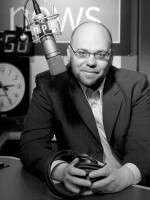Of the hundreds of people we've met while covering the economic crisis, not one has changed so thoroughly as Glen Pizzolorusso. Back in May 2008, he appeared in a special collaboration between NPR and This American Life, "The Giant Pool of Money." The show looked at the chain of subprime mortgage securitization and explained how the crisis began. A year and a half later, we decided to check in with him and a few of the others who helped us understand that cycle of boom and bust.
For Pizzolorusso, the story started when he was just 14 and working in his father's mortgage firm. Making a habit of 60-hour weeks, he found his way up from his father's company to a position as head of a subprime mortgage sales team. He was bringing home more than $100,000 a month, choosing each day which of his five cars to drive, shuttling between two luxury homes, partying in expensive New York City nightclubs.
Pizzolorusso, still in his 20s, was living the glamorous life. "We rolled up to Marquee at midnight with a line 500 people deep out front," he said last year in the special This American Life episode called "The Giant Pool of Money."
"Walk right up to the door: 'Give me my table.' Sitting next to Tara Reid and a couple of her friends. Christina Aguilera was doing some 'I'm Christina Aguilera and I'm gonna get up and sing' kind of thing. Who else was there? Cuba Gooding and that kid from Filthy Rich: Cattle Drive. What was that kid's name? Fabian Barabia? We ordered three, four bottles of Cristal at $1,000 per bottle. They bring it out — you know they're walking through the crowd, they're holding the bottles over their heads. There's firecrackers, sparklers. You know, the little cocktail waitresses. You know, so you order three or four bottles of those and they're walking through the crowd and everyone's like, 'Whoa, who's the cool guys?' We were the cool guys. They gave me the black card with my name on it. There's probably 10 in existence. You know? And that meant that I spent way too much money there."
The good times lasted until the subprime mortgage bubble burst. Pizzolorusso entered his own personal financial crisis. He lost everything. His company is out of business. He lost the Porsche and the other cars. He lost his home to foreclosure. He can't afford to rent a place, so he's staying at a house his dad owns, the one where he grew up.
"I have been humbled," he says today. "I mean, I've been forced to be humbled. I have a different outlook of what is important. I used to think that it mattered; it doesn't. None of the monetary stuff that we are preconditioned to think is important matters."
Instead of partying, Pizzolorusso spends most of his time now with his wife and three kids. He's in school and loves it. He never liked school before. He's reading a lot of books about politics and history. He never liked reading before. He says it's like a new Glen has arrived.
'People On Wall Street Were Bad'
If you have the impression that everyone on Wall Street walked away from this crisis without losing any money, bailed out by the government, then Jim Finkel would like to set you straight. We met Finkel in early 2008, at a kind of black tie dinner and awards ceremony for the year's best securitized financial instrument. This was before everyone starting calling those "toxic assets."
This has been a rough year and a half for Finkel. His business was built entirely on the most complex subprime mortgage securities. Like Pizzolorusso, he rode the bubble up to great riches, and then it burst. "I never thought that, as a startup manager, we could possibly be managing $5 billion, let alone that we could lose 60 percent of it," Finkel says.
Finkel was an asset manager, which is like a subcontractor for big investment banks on Wall Street. Someone at, say, Merrill Lynch would hire his small company to put together mortgage-backed investment deals. Finkel made his money by investing in the assets he created. When they went up, during the bubble, he made money. When they lost value, he lost everything. The investment banks made money a different way.
"Those guys took a bunch of upfront fees out of those deals," he says. "And even though their banks went belly up, a lot of people made an enormous amount of money and moved on."
Finkel didn't lose houses or cars, like Pizzolorusso. He did lose millions of dollars, but he's doing fine. Finkel says this year has been awful in a different way. He remembers that when he first started working with firms on Wall Street, years ago, he had a few mentors who warned him about something.
"They all tried to convince me that people on Wall Street were bad," he says. "Nobody seemed to be bad. This set of events did convince me that people on Wall Street were bad." He says the crisis and the way Wall Street people behaved in it proved his mentors right.
Finkel's company, Dynamic Credit, is still in business. It doesn't create subprime mortgage securitizations anymore. Now, investors who bought those toxic assets during the bubble hire Finkel to figure out whether there is anything of value left.
Chicago Public Radio's This American Life will air an updated hour of "The Giant Pool of Money" throughout the weekend on public radio stations around the country.
Copyright 2022 NPR. To see more, visit https://www.npr.org. 9(MDAzMjM2NDYzMDEyMzc1Njk5NjAxNzY3OQ001))







